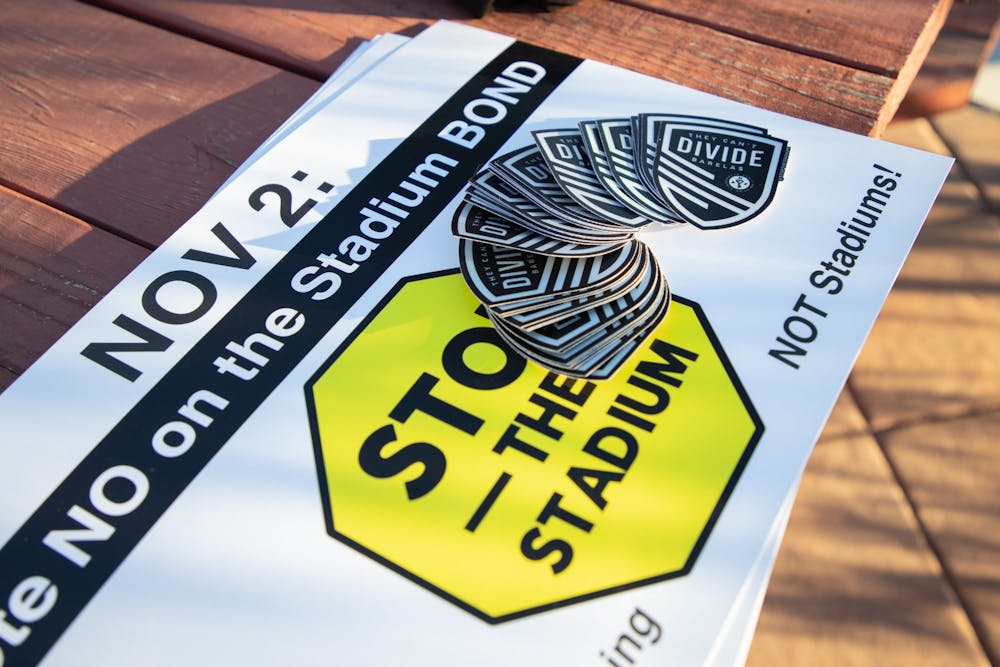In anticipation of the Nov. 2 vote on a $50 million bond that would fund a multi-purpose sports stadium in Albuquerque, a free screening of “Battle for Brooklyn,” a documentary focused on gentrification, was shown at the Albuquerque Center for Peace and Justice on Tuesday. This event was hosted by Stop the Stadium, a local collection of constituents concerned about the stadium causing potential gentrification in the South Broadway and Barelas neighborhoods.
Stop the Stadium wants voters to vote “no” on the bond question, which was emphasized through the documentary that details a neighborhood’s attempts in the Brooklyn borough of New York City to push back on displacement and gentrification caused by real estate development.
Anna Lee Desaulniers, an organizer for Stop the Stadium, said the group chose to host the event at the Albuquerque Center for Justice and Peace as a “history lesson” to help educate others on the gentrifying effects similar projects have had in other communities. This, she said, will allow “historical context as to the battle we're fighting.”
“We've done our research; we know the type of damage that publicly-funded stadiums create,” Desaulniers said. “We know that stadiums are always placed in low-income areas, and disproportionately affect Latinos, Chicanos and African American people.”
Jim Harvey, the executive director of Albuquerque Center for Peace and Justice, used to live in Brooklyn and said the movie had “personal significance” for him, especially since he’s seen chain stores take over neighborhoods in the past. Harvey said that Albuquerque is doing very little to mitigate homelessness, which is highlighted for Harvey especially since the center distributes food to more than 7,500 people — most of them unhoused — every weekend.
“To put the community on the hook for $50 million ... is absurd. It's absurd,” Harvey said.
Elizabeth Farrington, a member of Stop the Stadium, said she worries for families who will be displaced because of the stadium, as well as increased traffic that the Barelas and South Broadway neighborhoods can’t handle.
“People have been there three, four generations of families and (they) are going to have to lose their family homes because of that,” Farrington said.
However, some community members do stand in support of the stadium. Lisa Padilla, president of the Barelas Neighborhood Association, is in support of the creation of the stadium so long as a community benefits agreement (CBA) is drafted, and said that the neighborhood association has been working against gentrification and will continue to.
“I think that (the stadium) has a lot of potential to become something that could improve the quality of life for people who live here, and hopefully without displacement,” Padilla said. “I mean, of course, there's going to be, probably, some gentrification, but we're trying our best to mitigate that as much as we can in a proactive way.”
Still, others don’t think that the CBA is enough to protect the affected community, such as Stop the Stadium organizer Bex Hampton. Another organizer, Nick Rimmer, said that CBAs have historically not been as protective as intended, which was also emphasized by attorney Julian Gross at past public forums. Gross has had experience in negotiating for CBAs and was hired by the city to draft one if the stadium bond passes.
Rimmer specifically takes issue with the possibility of a non-disparagement clause, or a clause prohibiting the parties who agree to the CBA from publically speaking negatively about the stadium project. These clauses are present in many of the CBAs previously drafted by Gross.
Get content from The Daily Lobo delivered to your inbox
“The people who sign it can't disparage the stadium project in the news so all the issues with the stadium then become (concealed),” Rimmer said. “The community association can never come to the media (and) talk about their problems that they're having with the enforcement of CBA.”
The organizers have also been involved in direct voter outreach, such as going door-to-door to talk to local residents. Desaulniers said that most of the community members they’ve talked to are already against the bond.
“The bulk of what we have done has been door-to-door outreach, and that's because we wanted to be face to face with residents, and actually just talk to them about how they felt about (the stadium project), and the overwhelming majority think that this is just not what we need,” Desaulniers said.
Organizers hope that the work they have been doing in the final week leading up to Nov. 2 encourages people to get out and vote “no” on the bond question.
Maddie Pukite is a beat reporter at the Daily Lobo. They can be contacted at news@dailylobo.com or on Twitter @madelinepukite






